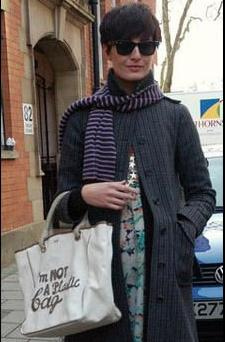Environmental protection can also be very fashionable.
In today's thriving entertainment industry, the general public often focuses on the glitzy world of celebrities. In that world, everything is dazzling, fashionable, and seems to be separated from the human world by a vast gap, making it feel surreal. However, whether intentionally or as a gesture of goodwill, the entertainment industry frequently uses the banner of charity to link luxury with mountainous areas and poverty. Yes, their goal is to constantly create topics, maintain freshness, and more importantly, enhance their sense of nobility.
Take canvas bags for example. Environmental protection has become a fashion trend. When the fashion world began to embrace the topic of environmental protection, the packaged concept of environmental protection immediately shed its previous image of high-mindedness and sacrifice, transforming into a fashionable topic. Interpreting environmental protection from the perspectives of consumption, beauty, and renewal suddenly placed it in a new and wonderful realm.
With pollution becoming increasingly severe, various beauty products have begun to emphasize "nature," "plant extracts," "no additives," and "green cosmetics." This allows users of cosmetics to contribute to environmental protection while using these products. The words of Anita Roddick, head of The Body Shop, have become a famous saying in the beauty industry: "We recycle everything as much as possible. My mother always said, don't waste containers that can still hold things, and don't buy anything you don't need." Not letting used cosmetics become difficult-to-handle pollutants has also become a slogan for fashion-conscious individuals. If it's not environmentally friendly, it's not fashionable.
Famous designers have also begun to launch a series of eco-friendly fashions, promoting the idea of revering nature, which has quickly become a hot topic. These renowned designers use natural materials to design clothing, showcasing their support for environmental protection. Barneys New York announced the launch of eco-friendly clothing, Nordstrom produced some organic clothing, and several H&M organic cotton products have already hit the market. More fashion shows by famous designers are using "revere nature, protect nature, strengthen environmental protection" as their theme. Not only are fashionable clothes made from eco-materials, but exhibition halls are built with recycled paperboard, and bio-diesel is used as energy during exhibitions to demonstrate energy conservation and environmental protection.
As the theme of environmental protection deepens, merchants are designing and producing a variety of products that contribute to sustainable environmental development, all while being stylish and novel. They craft environmental protection with elegance, making consumers feel noble as they use these products.
Although environmental protection is a very worthwhile nationwide movement, we still do not wish to see incidents like the "I'm not a plastic bag" stampede occur. Photos of celebrities like Keira Knightley, Reese Witherspoon, and Lily Cole carrying the "I'm not a plastic bag" appeared in various newspapers and magazines, sparking an exaggerated rush to purchase among the public. The meaning of environmental protection has been lost in this event. However, we also hope, as Anya Hindmarch said, that as long as someone uses this cloth bag, the message of environmental protection will spread wherever they go.
